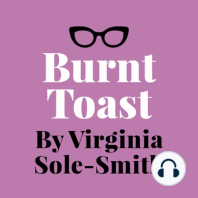26 min listen

"Well, if we have to break the law, how are we going to do it?"
"Well, if we have to break the law, how are we going to do it?"
ratings:
Length:
41 minutes
Released:
Jul 21, 2022
Format:
Podcast episode
Description
People don’t have a choice about whether or not to fight these things. You have to keep learning all you can, you have to keep finding the allies you can. And to despair is to abandon all the people who need us most.You’re listening to Burnt Toast. This is the podcast about diet culture, fatphobia, parenting, and health. I’m Virginia Sole-Smith, and I also write the Burnt Toast newsletter. Today is a very special episode because I am interviewing one of my very favorite people in the world: My stepmother, Mary Summers. Mary is a Senior Fellow in the Fox Leadership Program and a lecturer in political science at the University of Pennsylvania. She’s also a former physician assistant, political speechwriter, and a lifelong activist. And 52 years ago, she and three other activists made a 28 minute black and white film about what it was like to live in a country where abortions were illegal. (Watch it and get involved!) This was in 1970. The Roe v Wade Supreme Court decision legalizing abortion throughout the country was three years in the future. And of the approximately 800,000 abortions performed in 1970, only 1% were obtained legally. 300,000 resulted in complications and 8000 resulted in death. We are now living in post-Roe America. There is much about this fight that has changed in the past 52 years, but also much that stays the same. So, I asked Mary to come chat with me about her work on the film as well as what we can learn from the people who fought for legal abortion before as we begin to do it again. PS. Mary was delighted to donate her $100 podcast honorarium to the National Network of Abortion Funds. Thank you to the Burnt Toast paid subscribers who made that possible! And big news: The Burnt Toast Giving Circle has exceeded our goal! We’ve raised $20,111 and counting for Arizona state legislature races. You can join us here, and read more about why that helps in the fight to legalize abortion here. Episode 53 TranscriptVirginiaLet’s start by telling listeners a little bit about you and about your work.MaryI am a senior fellow with the Robert Fox Leadership Program at the University of Pennsylvania. I’ve been, for the last 20 years, a lecturer in political science, teaching service learning courses on the politics of food and agriculture and on schools as sites where inequalities and economic status and and health, health especially, can either be addressed or reproduced. My students, as well as being in class with me, are working in schools and after-school programs and food stamp snap enrollment campaigns and programs like that, so that they’re learning about institutions on the ground as well as in the classroom.VirginiaAnd that just one of many things you have done in your life. Do you want to also just go back a little further and tell us what you did, especially around the time you made the film?MaryI got involved in making the film right as I was graduating from college in 1970 I was at Radcliffe. And I had gotten interested in film, and interested in the women’s movement. That period at Harvard was the height of the anti-war movement. We basically were on strike most spring semesters that I was there. Especially the Harvard strike of 1969 was really important to me, seeing the entire university mobilized around stopping ROTC on campus. People who had been meeting in tiny rooms trying to organize, by the end of that strike, were meeting in the football stadium. Faculty and students were working together, voting on the demands of the strike and passing them overwhelmingly and the administration basically conceding everything we were fighting for. That gave me a real sense that we could change the world. In the years both prior to and after graduation, I was also getting more interested in the women’s movement as one more important way of thinking about relationships within the anti-war movement, within the student movement, and in society as a whole. Men were clearly very dominant. And women were starting to be
Released:
Jul 21, 2022
Format:
Podcast episode
Titles in the series (100)
On Trusting Little Kids To Eat by Burnt Toast by Virginia Sole-Smith